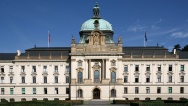Press Advisories
4. 12. 2009 13:59
The Gala Award Evening of the Government Committee for People with Disabilities
On the 4th December 2009 at Prague's Lichtenstein Palace the XVI. gala evening of the Government Committee for People with Disabilities took place on the occasion of the International day for people with disabilities.
The prizes at this gala evening which has been hosted by the Government Committee for People with Disabilities(VVZPO) since 1994, were divided into several categories.
The United Nations established the 3rd December as the International day for people with disabilities. This was to commemorate the adoption of the international program to support human rights of people with disabilities and to create equal opportunities for their full participation in society. The International day of people with disabilities has a specific topic each year which determines the prime focus area for the next period. The theme of this year is based on the document approved by the United Nations' Millennium Development Goals and focuses on empowering people with disabilities and their organisations worldwide. The aim of the United Nations and other multinational organisations and individual States is to continue to integrate people with disabilities into all aspects of life. Despite all the efforts the projects intended for the integration of people with disabilities into society are not being successfully achieved to the required extent. The chosen topic is to help facilitate this process.
This evening is traditionally associated with prizes for current affairs activities. For several years this tradition includes prizes for business activities on behalf of people with disabilities. This work significantly helps to improve the quality of life of people with disabilities and their integration into normal life. An important dimension for assessing the quality of life is generally the range of opportunities for self-realisation for each individual in society. Therefore it is necessary to respect and value those who significantly contribute to the integration of people with disabilities into everyday life.
During the evening the awards were split into two main categories. Both are based on the National Plan for Support and Integration of People with Disabilities for the period 2006 - 2009. The first was the award for business activities involving the employment of people with disabilities. The Ministry of Industry and Trade in co-operation with the Association of Employers of the Disabled in Czech Republic awards entrepreneurs, individuals and legal entities who in the assessment year significantly contributed towards the creation of equal opportunities, self-realisation and employment opportunities for people with disabilities and thus opened the way for their independence, together with economic and social integration. This year the award was presented by the Representative of the Minister of Trade and Industry - Robert Szurman and the Vice President of the Economic Chamber and President of the Union of the Czech Republic - Jan Wiesner. The prize was given to Finesko company which employs people with disabilities in company branches in the Czech Republic countrywide since the foundation of the company in 1997. Finesco is also active in the field of accounting and tax records as well as in production, trade and services and road transport. Another prize was given to the co-operative production team, which was founded in 1951 as VKUS – the co-operative production team for the disabled. From the very beginning the company was focused on employing people with disabilities for a production program of manufacturing working clothes. VKUS currently employs more than 180 employees in 3 clothes manufacture premises in Frýdek-Místek, Havířov and Třinec. The production of confectionery and bakery is managed in a sheltered workshop in Příbor. In 2008 a series of measures were implemented to reduce the costs and increase the running efficiency of the co-operative. The third and last organisation which received the award for business activities involving the employment of people with disabilities, was Čegan Ltd. from Šlapanice. The owner of the company - Slavoj Čegan found the courage to employ the first job seekers with disabilities in 2002. The company currently employs 95 employees with disabilities out of a total of 168 employees. The company deals with the injection of thermoplastics, production of building fittings, stainless steel and plastic production with the Holar brand, metal production, sorting parts for the automotive industry and sales of building materials.
The second award since 1994 presented by the Government Committee for people with disabilities is the VVZPO Prize for current works on the issue of disability. This year 50 works were assessed by an independent twelve-judge panel. The prizes are given to works of current affairs which draw attention to the issue of disability in the most appropriate way. The chief criteria for assessment is how the work reaches general public in terms of acquaintance with the issue and how positively it influences attitude of the general public towards people with disabilities. The prizes are presented in 4 categories – television, radio, press and the internet.
The first award given out was in the category for published written works. It was for both current articles from the daily press and newspapers and magazines from organisations for people with disabilities. The prizes were given by the Prime Minister Jan Fischer who is also the Chairman of VVZPO. The first prize was received by Jana Makovcová for her book ''Maminko, nezpívej'' (Mama don't sing). The book was published by ALMI and it is an open testimony of a mother of two young children 'under a spell'. It is a story of love, hope, worries and joys of the whole family. The boys despite all of their health disadvantages, unexpectedly enriched their mother. It renewed her motherly strength, faith, sensitivity and intuition and she is able to talk about her experiences with grace and humour. The second prize was received by Eliška Stráníková for her article ''Dnes je lepší doba'' ( Times are better now), which is about a deaf transvestite. The purpose of the article which was published in the magazine UNIE, is to demonstrate the overcoming of prejudices and communication barriers as presented from the perspective of a deaf person. The third prize was given to Viktorie Bartoníčková and Alžběta Dvořáková for a book published by Portál entitled ''Cesta Mlčení'' (Way of Silence). The book has a sub-heading ''Příběh o vůli překonat ztrátu řeči po cévní mozkové příhodě'' (The story of the will to overcome the loss of speech after a stroke). It is an autobiography of one of the authors. It offers an insight to those who have experienced strokes and especially to their family members and friends. The Prime Minister Fisher gave the certificate of merit in this category to Lucie Křesťanová for her interview published in Gong magazine. The interview which was conducted with a deaf psychologist on the issue of education of deaf children, is based on her own life experience.
The prizes in the radio broadcasts category were given by the Minister for Human Rights and the executive Vice-Chairman VVZPO Michael Kocáb. The first prize was received by Silvie Kleková from Czech Television Ostrava for the program ''Ztraceni v sobě'' (Lost in ourselves) from the documentary series ''Ta naše povaha česká'' (That Czech nature of ours). The program is concerned with the topic of Alzheimer's disease in Czech Republic which also raised a number of burning issues such as the aging population, the attitude of the general public towards the elderly and the ill, the quality of treatment of this disease and the inseparable social care for the patients in Czech Republic in comparison with other developed countries. The second prize was awarded to David Macháček, Radek Kudela and Kamil Hrzal for the two-part coverage ''(Bez)dlužníci'' ((Non)debtors) which was broadcast on Czech Television Prague on the show ''Reportéři ČT'' ( Czech TV Reporters). This show highlights the issue of the compliance of the Ministry of Labour and Social Affairs with the law to support the employment of people with disabilities. This law was amended in 2008 by a debt-free requirement of the party which operates a sheltered workshop applying for funding to subsidise wages for the work performance of people with disabilities. The show helped to negotiate a remedy to this situation. The Czech Television show ''Klíč č. 11/2009'' (Key No. 11/2009) by Barbora Drahoňovská, Aleš Sobotka and Michaela Fialová received the third prize in the category for television programs. The film is a reminiscence of the summer in which several people with various types of disabilities spent their holiday doing sports activities by the sea in Croatia. The film offers hope to people with diverse disabilities to live their lives to their full potential and gives them courage and optimism. The certificate of merit in this category was awarded by the Minister Kocáb for the show ''Dobrý sponzor ještě žije'' (A good sponsor still exists), again from the series 'That Czech nature of ours' by Silvie Kleková and Hana Teislerová from Czech Television Ostrava. The documentary highlights the complex situation for parents of children with severe disabilities and difficulties in obtaining alternative funding resources to ensure that all the needs of their children are met. The film demonstrates how television coverage of several real life case studies from last year generated huge solidarity from the general public which was followed up by charitable aid. This was a great source of help to people affected by disabilities and their families.
The Minister of Health and the Vice-Chairman of the Government Committee for people with disabilities - Dana Jurásková today gave awards in the category for radio broadcasts. The first price was received by Dagmar Misařová and Hana Kovalová from Czech Radio Ostrava for the show ''Labutí sen o duši'' (A swans' dream about a soul). It is a story of the Racek family and their three children. The youngest child is Zuzana who is affected by cerebral palsy. It is a time-lapse documentary in which the creators very sensitively capture the dreams and aspirations of a teenage girl. Despite the fact that Zuzana could not walk, talk and communicated only via a computer, she wrote a libretto for Swan Lake. The girl managed by her strong will and her passion for ballet to persuade her father Ilja Racek, to put on her piece in the Ostrava Puppet Theatre. Both parents helped their daughter to fulfill her dream. The second prize was received by Mirka Dámcová from Radio Classic FM for the series of programs called ''Mozek mi to nebral'' (My brain couldn't take it), which brings forth important information on how to recognise the first signs of an impending stroke. It stresses the importance of early and professional medical assistance. The value of this information is primarily in preventative measures which could result in the saving of many more human lives. The program also highlights the value of subsequent rehabilitation which can reduce the effects of the impact of strokes and which leads to the maximum potential self-sufficiency of the patients. The third prize was given by the Ministry of Health to Daniel Moravec for the program ''O lidech s upřímnou snahou učinit svět lepším. Pomáháme tak, kam oko nedohlédne'' (About people with a sincere desire to make the world a better place. We can help where the eye cannot see) from the series 'Good Will' which was broadcast on Czech Radio 2 – Prague. The civic association Okamžik (Blink of an eye), enables people with visual disabilities to become involved in publication activities. The program offers an insight into the creative world of people who demonstrate through their works how to live a beautiful life in its full potential. The certificate of merit was awarded by the Minister Dana Jurásková to Mirka Dámcová from Radio Classic FM for the series of programs ''Slovně zneužívaná'' (Verbally abused), which offers an insight into the lives of people with multiple sclerosis with their joys and problems, including for example the overcoming of various challenges or coming to terms with a deteriorating health condition. The programs' emphasis is on the irreplaceable role of civil associations which are very active in this field. The second certificate of merit in the category of radio broadcasts was awarded to Lenka Svobodová for the program ''VILLA VALILA'' from the series 'Good Will' on Czech Radio 2 – Prague. The program represents a married couple - Klíma, which founded a civic association in Červený Újezd u Votic, where a dilapidated villa from the First Republic was renovated and rebuilt into a community house with a garden and a farm, for young people with intellectual disabilities. Their integration into the local community is a testimony of the fact that the young people found a place were they really belong.
The last category for works published on the internet was concerned with the assessment of submitted articles as well as entire blogs or web sites by individual authors. The awards were given by the Minister for Labour and Social Affairs and the Vice-Chairman for the Government Committee for people with disabilities - Petr Šimerka. The first prize was received for the article ''Rodina z Benátek: Život s autistou není peříčko'' (A family from Benátky: Life with an autist is not a piece of cake) which was published on the web site www.boleslavský.deník.cz, created by Jiří Macek. The article is the story of Vojta and his mother who by her frequently non-compromising attitude both to authorities and to Vojta, managed to create conditions for him that enabled him to complete his primary education and now studies his favourite subject of a bookseller at an integrated secondary school. The web pages ''Konopí je lék'' (Cannabis is a medicine) at: www.konopijelek.cz by Dušan Dvořák, which received the second prize, are dedicated to the medicinal effects of cannabis. The web pages certainly do not promote the abuse of marijuana but offer information on the possibilities of alternative treatment in co-operation with doctors and other professionals. Cannabis can also bring relief to many people with various disabilities. The third prize was received by Radek Pavlíček for ''BLOG POMOC SLEPÝM UŽIVATELŮM'' ( The blog for helping blind users) published on the website: http://poslepu.blogspot.com. The blog is intended for users of information technologies with severe visual disabilities and especially for professionals who deal with presenting information in a way which is accessible to these users. The author not only presents his own articles but also experiences of his colleagues with disabilities.






